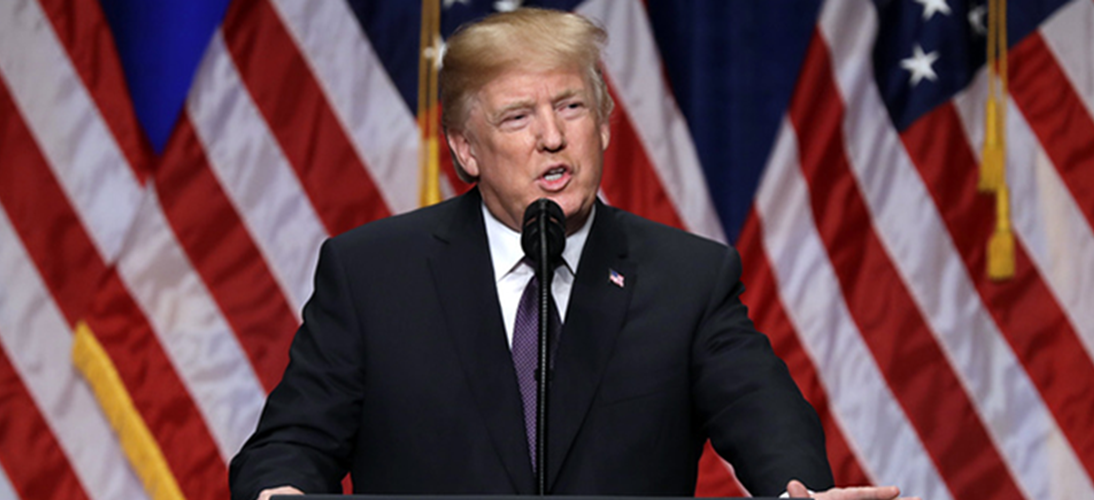
Trump Announces Tariff Hikes on Mexico, Canada, and China Over Drugs and Immigration
Nov, 26, 2024 Posted by Gabriel MalheirosWeek 202445
U.S. President-elect Donald Trump announced on Monday (25) plans to impose 25% tariffs on imports from Mexico and Canada, citing a need to halt what he described as an “invasion” of drugs and “illegal immigrants.” Trump also pledged to levy an additional 10% tariff on Chinese imports, adding to existing duties.
Throughout his campaign, Trump threatened to implement steep tariffs to protect domestic industries and wage a crackdown on illegal immigration and drug trafficking. He declared on his social media platform that these measures would take effect immediately upon his inauguration.
“On January 20, as one of my first Executive Orders, I will sign all necessary documents to impose a 25% tariff on ALL products entering the United States from Mexico and Canada through their ridiculous open borders,” the Republican billionaire posted.
He also expressed frustration over ongoing migration: “Right now, a caravan from Mexico, made up of thousands, seems unstoppable in its attempt to cross our currently open border.” Trump accused the current administration of failing to adequately curb migration and stated that the tariffs would remain until the inflow of drugs—particularly fentanyl—and “illegal immigrants” was halted.
Trump has long accused undocumented immigrants of harming the U.S., claiming that Mexico and Canada could “easily resolve this long-standing problem.”
China, however, remains a focal point of his strategy. Washington alleges that Mexican cartels manufacture fentanyl using precursor chemicals from China, which is linked to tens of thousands of overdose deaths annually in the U.S.
“I’ve had numerous conversations with China about the vast quantities of drugs, especially fentanyl, being sent to the United States, but to no avail,” Trump wrote on Truth Social.
“Their officials promised the harshest penalties, including the death penalty for any drug trafficker caught, but unfortunately, that has not materialized. Drugs continue to flood into our country, primarily via Mexico, at unprecedented levels,” he added. To counter this, Trump announced an additional 10% tariff on all Chinese products, a move aimed at pressuring Beijing to stem the flow of illicit drugs.
Tariffs have become a hallmark of Trump’s economic policies. During his campaign, he pledged to apply them to allies and adversaries alike, arguing that they are a necessary tool to protect American industries.
Critics, however, caution that such measures could stifle economic growth and drive up inflation, as the costs are typically passed on to U.S. importers and, ultimately, consumers. Yet Trump’s inner circle defends tariffs as an effective means of securing more favorable trade terms and reshoring manufacturing jobs.
International Reactions
The announcement elicited swift reactions from affected nations. A spokesperson for the Chinese Embassy, Liu Pengyu, warned that economic and trade cooperation between China and the U.S. is mutually beneficial. “No one wins in a trade or tariff war,” Liu said. He also noted that China has taken steps to curb drug trafficking, referencing joint anti-narcotics efforts agreed upon by Presidents Joe Biden and Xi Jinping last year.
Canada’s Deputy Prime Minister Chrystia Freeland reaffirmed the country’s commitment to border security and maintaining the integrity of its shared border with the U.S. Following a phone call between Trump and Canadian Prime Minister Justin Trudeau, Freeland noted, “It was a productive discussion, and both leaders agreed to stay in contact.”
Mexico’s House Speaker, Ricardo Monreal, criticized the tariff threats on social media, calling them counterproductive. “Escalating trade retaliation will only hurt people’s wallets and fails to address the underlying issues,” he said, urging bilateral cooperation to tackle human, drug, and arms trafficking.
Trump’s proposed tariffs could violate the United States-Mexico-Canada Agreement (USMCA), a trade pact designed to provide stability for cross-border investments. Mexico’s Ministry of Finance highlighted the agreement’s importance: “Mexico is the United States’ top trading partner, and the USMCA ensures a framework of certainty for domestic and international investors,” the ministry stated.
Canada and Mexico together account for a significant share of U.S. trade. In 2023, over 83% of Mexican exports and 75% of Canadian exports were destined for the U.S. The International Monetary Fund (IMF) has warned that sweeping tariffs could reduce global economic growth by 0.5%, potentially triggering a recession and exacerbating inflationary pressures in the United States.
Trump’s announcement marks the first of what is expected to be a series of measures aimed at advancing his “America First” agenda. As the world braces for the economic fallout, it is clear that his administration plans to prioritize domestic interests, even at the cost of disrupting international trade and diplomacy.
Source: Valor Econômico
Click here to read the original text: https://valor.globo.com/mundo/noticia/2024/11/26/trump-promete-tarifas-de-25-pontos-percentuais-a-mxico-e-canad-contra-invaso-de-drogas-e-imigrantes-ilegais.ghtml
-
Meat
Jan, 09, 2020
0
Revenues from Brazilian chicken exports grew 6.4% in 2019
-
Meat
Jun, 19, 2024
0
Huawei Reportedly Turns to Beef Imports Amid Payment Challenges in Argentina
-
Commodities
Jan, 02, 2025
0
Commodity Exports Lead at Port of Santos, While EPZs Offer Potential Shift
-
Grains
Nov, 11, 2021
0
ABITRIGO evaluates precautionary measure against GMO Argentine wheat

